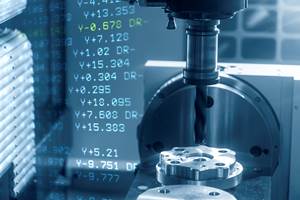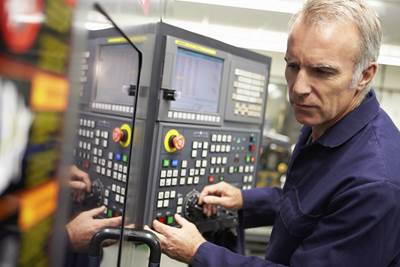CNC Intro-The Key Concepts Of Computer Numerical Control
Today, computer numerical control (CNC) machines are found almost everywhere, from small job shops in rural communities to Fortune 500 companies in large urban areas.
Share





Today, computer numerical control (CNC) machines are found almost everywhere, from small job shops in rural communities to Fortune 500 companies in large urban areas. Truly, there is hardly a facet of manufacturing that is not in some way touched by what these innovative machine tools can do. Everyone involved in the manufacturing environment should be well aware of what is possible with these sophisticated machine tools.
The design engineer, for example, must possess enough knowledge of CNC to perfect dimensioning and tolerancing techniques for workpieces to be machined on CNC machines. The tool engineer must understand CNC in order to design fixtures and cutting tools for use with CNC machines. Quality control people should understand the CNC machine tools used within their company in order to plan quality control and statistical process control accordingly. Production control personnel should be abreast of their company's CNC technology in order to make realistic production schedules. Managers, foremen, and team leaders should understand CNC well enough to communicate intelligently with fellow workers. And it goes without saying that CNC programmers, setup people, operators, and others working directly with the CNC equipment must have an extremely good understanding of this technology.
In this text, we will explore the basics of CNC, showing you much of what is involved with using these sophisticated machine tools. Our primary goal will be to teach you how to learn about CNC. For readers who will eventually be working directly with CNC machine tools, we will show you the basics of each major CNC function. Additionally, we will make suggestions as to how you can learn more about each CNC function as it applies to your particular CNC machine(s). At the completion of this presentation, you should have a good understanding of how and why CNC functions as it does and know those things you must learn more about in order to work with any style of CNC machine tool.
For readers who are not going to be working directly with CNC equipment in the near future, our secondary goal will be to give you a good working knowledge of CNC technology. At the completion of this presentation, you should be quite comfortable with the fundamentals of CNC and be able to communicate intelligently with others in your company about your equipment.
To proceed in an organized manner, we will use a "key concepts" approach to all presentations. All important functions of CNC are organized into ten key concepts. Think of it this way. If you can understand these ten basic principles, you are well on your way to becoming proficient with CNC. While our main focus will be on the two most popular forms of CNC machine tools (machining centers and turning centers), these ten key concepts can be applied to virtually any kind of CNC machine.
With so many types of CNC machine tools in existence, it is next to impossible for this presentation to be extremely specific about any one particular type. The key concepts allow us to view the main features of CNC in more general terms, stressing why things are handled the way they are even more than the specific techniques used with any one particular CNC machine tool. With this broad background, you should be able to easily zero in on any kind of CNC machine tool you will be working with.
As yet a third goal, this presentation should help instructors of CNC. The key concepts approach we show has been proven time and time again during live presentations in CNC courses. This method of presentation will help instructors organize CNC into extremely logical and easy-to-understand lessons.
Learn more about key concepts:
Key CNC Concept #1—The Fundamentals Of CNC
Key CNC Concept #2—Know Your Machine
Key CNC Concept #3—Understanding CNC Motion Types
Key CNC Concept #4—The Forms Of Compensation
Key CNC Concept #5—The Importance Of Program Formatting
Key CNC Concept #6—Methods For CNC Programming
Key CNC Concept #7—Know The Machine From An Operator's Viewpoint
Key CNC Concept #8—The Modes Of Machine Operation
Key CNC Concept #9—The Key Sequences Of Operation
Related Content
ERP Provides Smooth Pathway to Data Security
With the CMMC data security standards looming, machine shops serving the defense industry can turn to ERP to keep business moving.
Read MoreTips for Designing CNC Programs That Help Operators
The way a G-code program is formatted directly affects the productivity of the CNC people who use them. Design CNC programs that make CNC setup people and operators’ jobs easier.
Read More6 Machine Shop Essentials to Stay Competitive
If you want to streamline production and be competitive in the industry, you will need far more than a standard three-axis CNC mill or two-axis CNC lathe and a few measuring tools.
Read MoreCan AI Replace Programmers? Writers Face a Similar Question
The answer is the same in both cases. Artificial intelligence performs sophisticated tasks, but falls short of delivering on the fullness of what the work entails.
Read MoreRead Next
Key CNC Concept No. 1—The Fundamentals Of Computer Numerical Control
Though the thrust of this presentation is to teach you CNC usage, it helps to understand why these sophisticated machines are so important. Here are but a few of the more important benefits offered by CNC equipment.
Read MoreSetting Up the Building Blocks for a Digital Factory
Woodward Inc. spent over a year developing an API to connect machines to its digital factory. Caron Engineering’s MiConnect has cut most of this process while also granting the shop greater access to machine information.
Read MoreRegistration Now Open for the Precision Machining Technology Show (PMTS) 2025
The precision machining industry’s premier event returns to Cleveland, OH, April 1-3.
Read More
.jpg;width=70;height=70;mode=crop)

















.jpg;maxWidth=300;quality=90)











